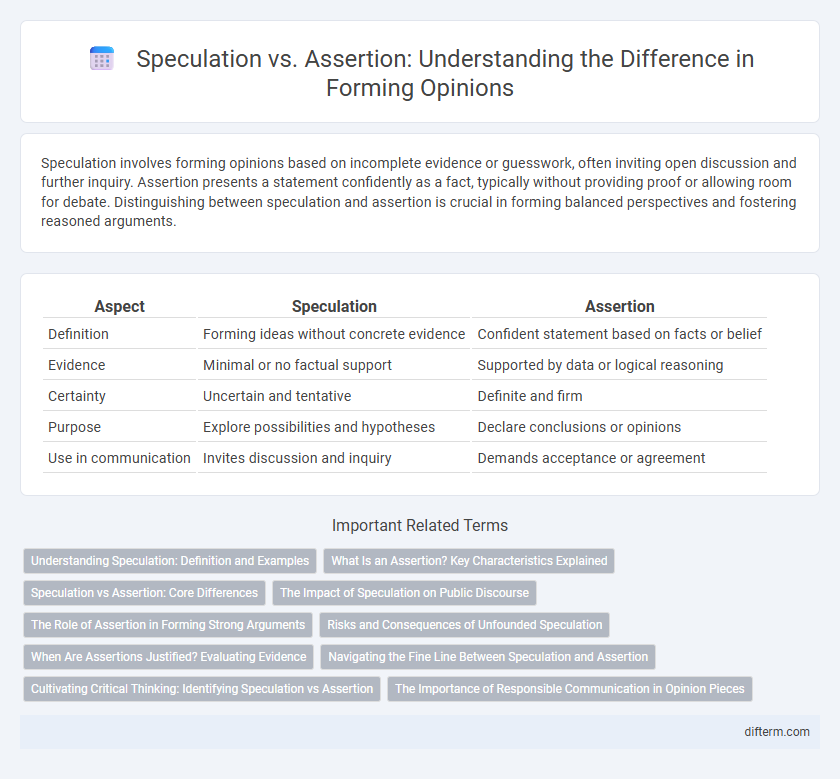Speculation involves forming opinions based on incomplete evidence or guesswork, often inviting open discussion and further inquiry. Assertion presents a statement confidently as a fact, typically without providing proof or allowing room for debate. Distinguishing between speculation and assertion is crucial in forming balanced perspectives and fostering reasoned arguments.
Table of Comparison
| Aspect | Speculation | Assertion |
|---|---|---|
| Definition | Forming ideas without concrete evidence | Confident statement based on facts or belief |
| Evidence | Minimal or no factual support | Supported by data or logical reasoning |
| Certainty | Uncertain and tentative | Definite and firm |
| Purpose | Explore possibilities and hypotheses | Declare conclusions or opinions |
| Use in communication | Invites discussion and inquiry | Demands acceptance or agreement |
Understanding Speculation: Definition and Examples
Speculation involves forming opinions or conclusions based on incomplete evidence or uncertain information, often to predict future events or explain unknowns. Examples of speculation include hypothesizing about the outcomes of political elections or market trends without concrete data. Understanding speculation helps distinguish it from assertive statements grounded in verified facts and solid reasoning.
What Is an Assertion? Key Characteristics Explained
An assertion is a confident and clear statement presented as fact, often without requiring immediate evidence. It is characterized by its definitive tone, aiming to persuade or establish a position firmly. Unlike speculation, which is based on conjecture or hypothesis, an assertion conveys certainty and authority in communication.
Speculation vs Assertion: Core Differences
Speculation involves forming opinions based on incomplete or uncertain information, relying heavily on possibilities rather than concrete facts. Assertion presents claims confidently, often supported by verified evidence or strong reasoning to establish credibility. Understanding these core differences is essential for evaluating arguments and distinguishing between informed conclusions and mere hypotheses.
The Impact of Speculation on Public Discourse
Speculation often blurs the line between informed opinion and unfounded assertion, shaping public discourse in ways that can mislead or polarize audiences. When speculation dominates conversations, it risks diluting evidence-based analysis, creating environments where rumors overshadow facts. This shift impacts decision-making processes and public trust, underscoring the need for critical engagement and source verification in information sharing.
The Role of Assertion in Forming Strong Arguments
Assertion plays a crucial role in forming strong arguments by providing clear, confident statements that anchor the discussion and guide the audience toward the intended conclusion. Unlike speculation, which is based on conjecture and uncertainty, assertion demands supporting evidence, enhancing the credibility and persuasiveness of the argument. Effective use of assertion sharpens focus, emphasizes key points, and fosters a compelling narrative that withstands counterarguments.
Risks and Consequences of Unfounded Speculation
Unfounded speculation poses significant risks, including the spread of misinformation and erosion of public trust, which can lead to hasty decisions based on inaccurate data. Assertions grounded in verified facts mitigate these dangers by providing a reliable foundation for discourse and policy-making. Ignoring this distinction increases the likelihood of harmful consequences in sectors such as finance, healthcare, and governance.
When Are Assertions Justified? Evaluating Evidence
Assertions become justified when supported by credible, verifiable evidence that directly relates to the claim. Evaluating the quality, source, and consistency of evidence helps distinguish informed assertions from mere speculation. Critical analysis of data and context ensures that assertions contribute meaningfully to rational discourse rather than unfounded opinion.
Navigating the Fine Line Between Speculation and Assertion
Navigating the fine line between speculation and assertion requires a clear understanding of evidence-based reasoning versus conjecture. Speculation involves forming opinions without sufficient proof, while assertion demands confident statements supported by verifiable facts. Maintaining this balance is crucial in promoting credible discourse and avoiding misinformation.
Cultivating Critical Thinking: Identifying Speculation vs Assertion
Distinguishing speculation from assertion is essential for cultivating critical thinking, enabling individuals to evaluate information based on evidence rather than assumptions. Speculation often involves conjecture without sufficient support, while assertions require verifiable facts and logical reasoning. Developing this skill sharpens analytical judgment and promotes informed decision-making in complex discussions.
The Importance of Responsible Communication in Opinion Pieces
Responsible communication in opinion pieces demands distinguishing speculation from assertion to maintain credibility and foster informed dialogue. Clear labeling of speculative ideas prevents misinformation, ensuring readers understand what is conjecture versus evidence-based statements. Upholding this standard strengthens public trust and promotes constructive discourse on complex issues.
speculation vs assertion Infographic

 difterm.com
difterm.com